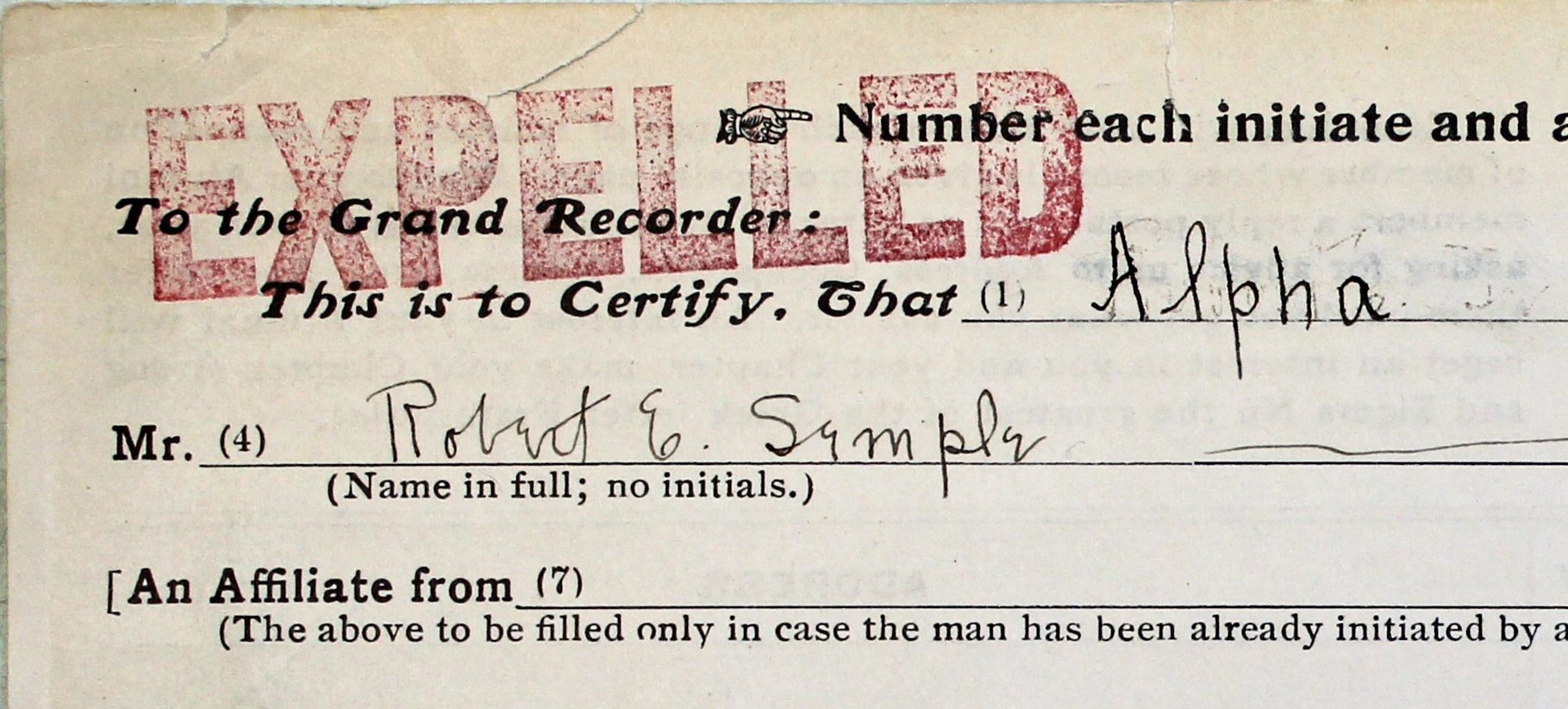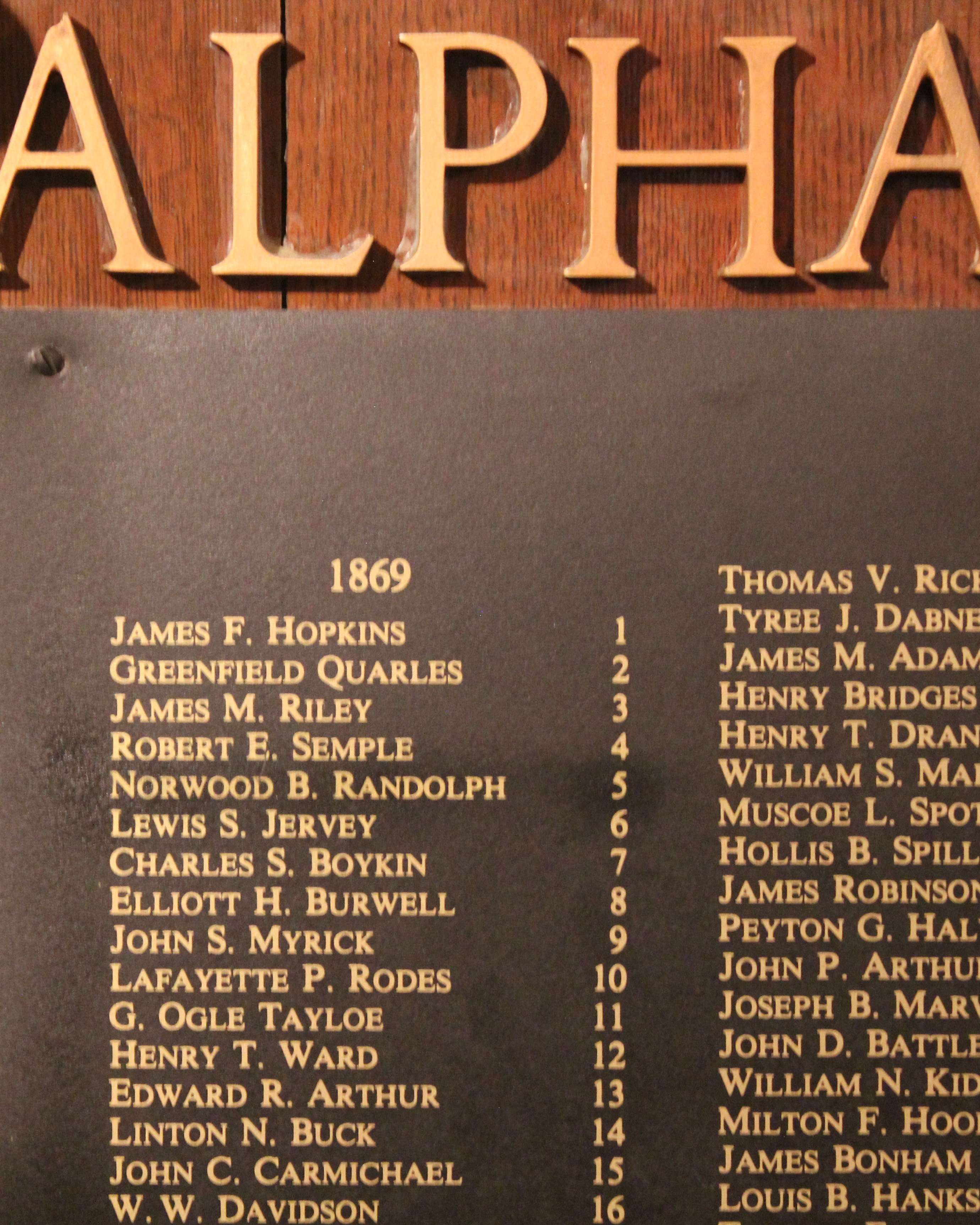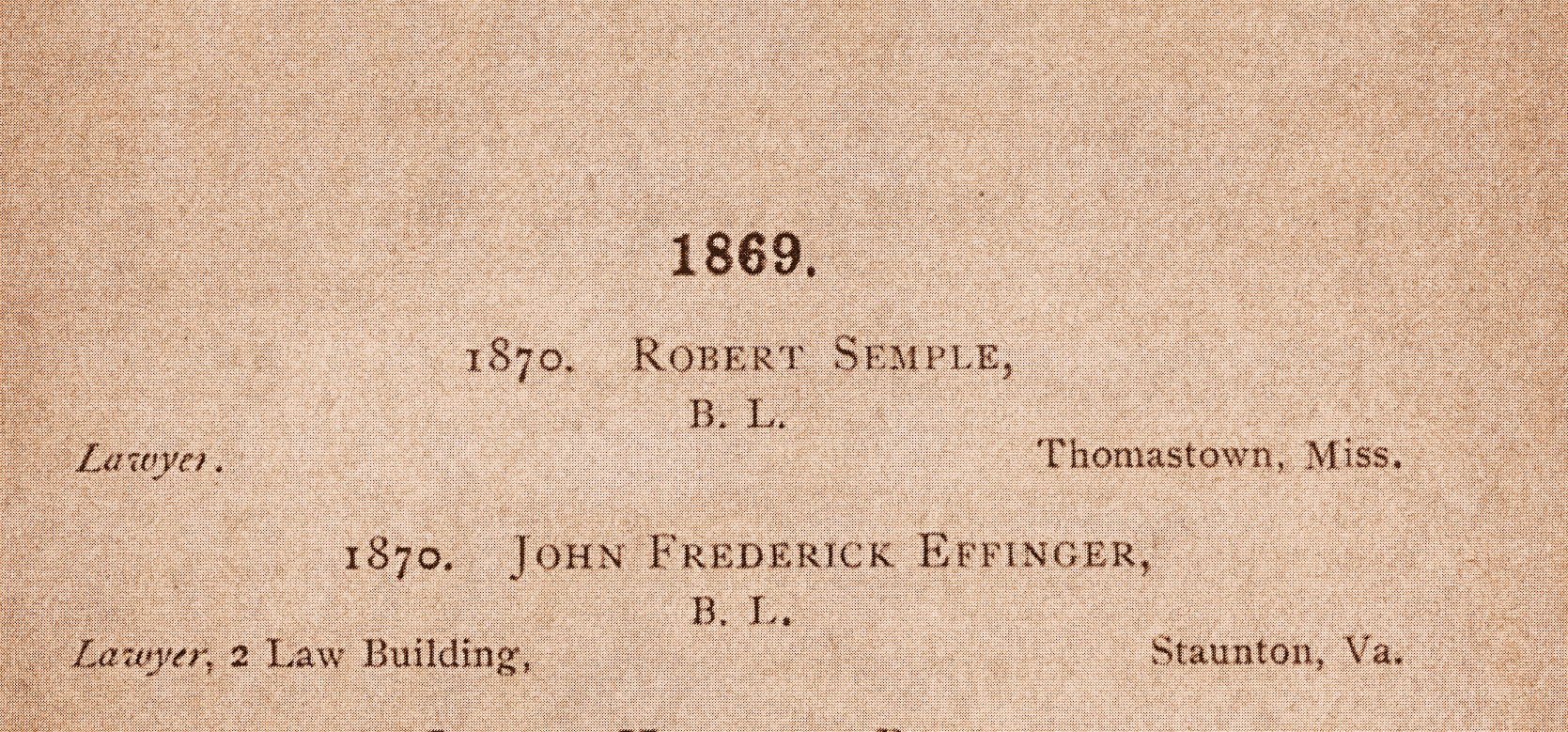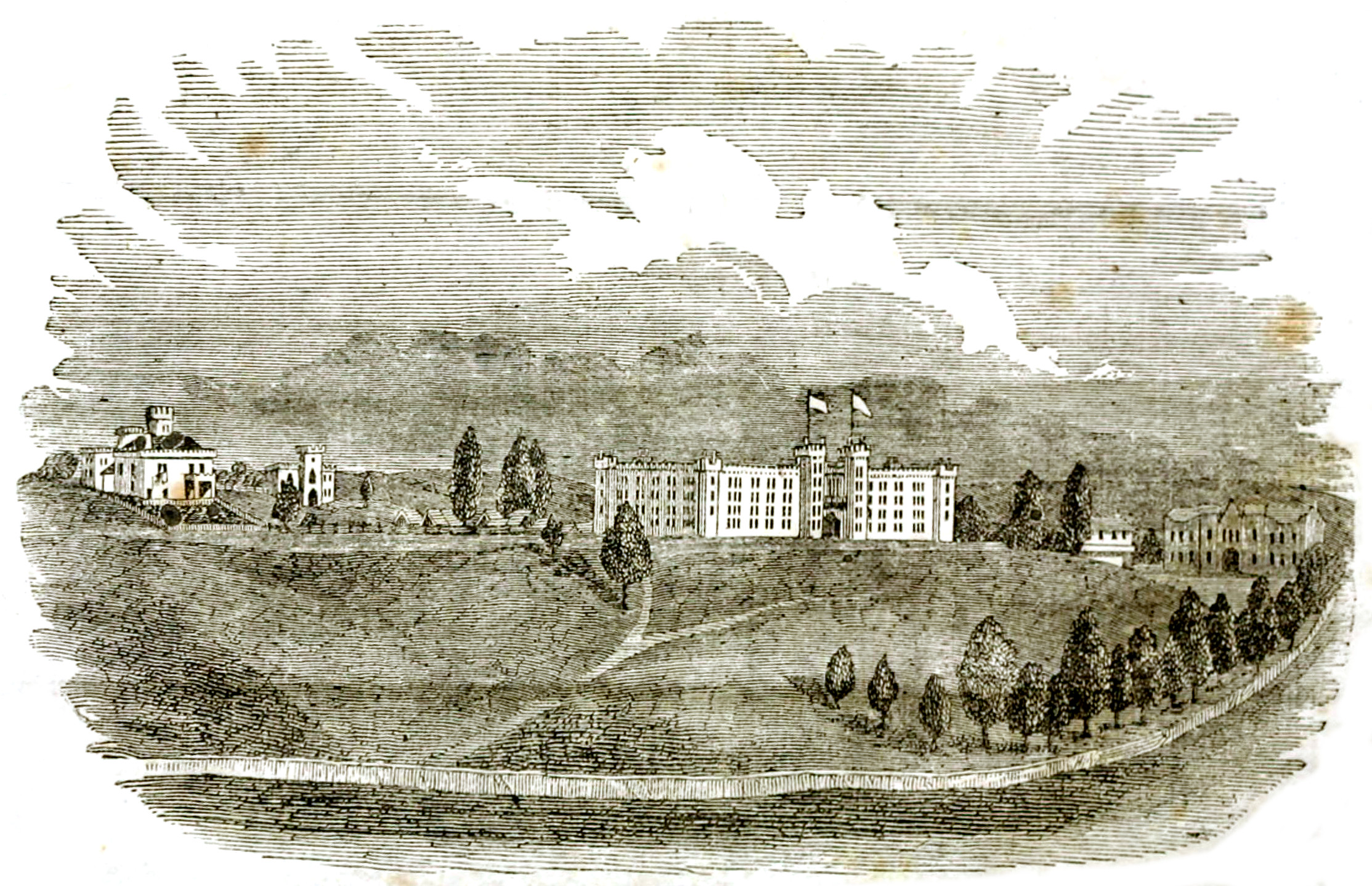The Curious Case of Robert Semple
Perspectives on Our Past

By Grand Historian Bob McCully (San Diego State)
Robert Semple was among the very first to take the oath of membership in the Legion of Honor. He was also the first member to be expelled, and for a reason not even against the Constitution of Sigma Nu at the time. Although his expulsion was little more than a year after the Fraternity’s founding, at the time he had already graduated from VMI. Yet 35 years later, the High Council asked the three Founders whether he should be reinstated.
What caused this curious set of events? What was his offense? Was he a traitor or merely an opportunist? Why so many years later was a case made for his reinstatement? How did Hopkins, Quarles and Riley respond regarding a reinstatement?
Unfortunately, most of the early Alpha Chapter records were either not recorded or have been lost due to time or fires. John Scott mentions in The Story of Sigma Nu that fires at the homes of John Alexander Howard and Grant Woodbury Harrington resulted in the loss of many of the original Alpha Chapter records they had been gathering.
Thus, it’s difficult to piece together the exact set of events that took place. Memories are often inaccurate and fade over time. However, Semple’s letter to the original members of Alpha Chapter after their action to expel him, perhaps the first correspondence ever received by Sigma Nu, has survived and is preserved in our archives in Lexington — although at some point in the past it was torn into pieces. Through this document and other materials, I’ll attempt to put this matter in perspective.
Robert Semple
So what do we know about Robert Semple? He was born on November 12, 1848, in Wilkinson County, Miss., to Robert Semple and his second wife, Francina Rosaltha Wade. His grandfather, Colonel Robert Semple, owned Desert Plantation in St. Francisville, La. It was a 1500 acre cotton plantation. His father moved to Wilkinson County, Missi., owned Wyoming Plantation, and was a planter. His father fought for the Confederate side in the Civil War and was issued a pardon after the war by President Andrew Johnson, dated August 21, 1865.
Robert Semple enrolled at VMI on October 17, 1865, and graduated on July 2, 1869, just six months after Sigma Nu’s official birth. After graduation, he remained in Lexington to attend law school at Washington College (now Washington & Lee University). While attending law school, he also served as an assistant professor of languages at VMI. He received his law degree with the class of 1870 and returned to Mississippi to practice law.
Soon after, he relocated to northern Louisiana and the town of Harrisonburg. After two years in Harrisonburg, he moved to Pointe Coupee Parish, La., and practiced law there for the rest of his life. On September 11, 1872, he married Sarah Louise Burress and they had six children.

In 1877, he was elected to the parish Police Jury and served two terms as president. In most of the parishes in Louisiana, the Police Jury is the elected governing body, handling both the legislative and executive functions of the parish. He was elected district attorney in 1879 and in 1888 was elected district judge of the Fifteenth judicial district. He resided on a 240 acre plantation on the Mississippi River. He was a well-respected attorney and judge and a prominent citizen of the area.
He died on May 22, 1905, in New Orleans and is buried in Woodville, Miss.. He was 56 years old.
His Offense
So, what did he do to justify being brought to trial by Alpha Chapter? The April 1883 issue of The Delta contained a couple of extracts from the early minutes including the following note by J. P. Arthur (Alpha 39) dated February 10th, 1871.
“Mr. R. E. Semple, of Mississippi, having joined another secret society, it was decided at the meeting before the last recorded, that although he had not acted contrary to the old Constitution, that the choice should be given him of leaving it, and remaining with the Legion of Honor, or of leaving the latter entirely. He said that he was sorry he had acted so, but could not honorably leave the one he had lately joined. He was dismissed.”
His offense — joining another secret society: but which one and why? A historical note in early copies of The Liturgy states:
“At some time in the following year Mr. Semple joined another society, which was not Alpha Tau Omega, which had a brief existence, and whose very name is not certainly recorded.”
This provides a further clue towards identifying the organization he joined. My assumption is that the reference to “the following year” refers to an academic year. This means 1869-1870, when Robert Semple was attending law school at Washington College right next door to VMI. Further research shows that a chapter of Delta Psi Fraternity was started at Washington College on November 27th 1869. In the June 1889 catalogue of members of Delta Psi, Robert Semple of Mississippi, a law student, is listed as being initiated in 1869 by the Washington College chapter.

What would cause him to join another secret society? At this point, we do have a clue in the letter written on this case many years later by James Frank Hopkins. He stated, “he [Semple] connected himself with another frat[ernity], because…it had more members, and influence than we had.”
From the evidence we have, Robert Semple was an ambitious young man seeking a professional career in law. The Legion of Honor at that time was an organization of approximately 50 men with only one local chapter — at VMI. In 1869, after graduating from VMI, he was offered the chance to join a much larger national fraternity. Delta Psi was founded on the same day (January 17, 1847) at two institutions — Columbia University and New York University. By the time Robert Semple was initiated, chapters at fifteen additional institutions had been installed, although only eight were still active. Clearly, Robert Semple was motivated by his future professional aspirations more than his estrangement from his colleagues at Alpha Chapter.

Of the actual trial conducted by the members of Alpha Chapter, we have no further record than the note I provided earlier. We know that Semple did not attend the trial. After hearing whatever arguments were presented, the chapter voted to expel him. Greenfield Quarles communicated the results to Semple.
Semple’s Response
Semple sent a written response to Alpha Chapter regarding the trial and decision. It is housed in our archives in Lexington. It was a long letter and throughout reflects no desire to impugn the integrity of the Order, its men or their future success.
“Though the last link of friendship’s golden chain is ever shattered — though the fire of love that had burned so brightly through the lapse of many months is extinguished — still will the embers in the smoldering ashes reflect back the Pallid Image as the mind worships a happy past it never more can welcome. Though the hand that once clasped hand in the mystic grasp of friendly brotherhood is chilled by this tempest of separation, still shall it greet you kindly while the heart from out its innermost shrine shall bid you onward! onward! to a glorious destiny!”
However, it is clear from its tone that he did not feel he had done anything wrong or dishonorable.
“Heaven knows my motives free from malice or guile… Still I do find comfort and consolation in the rich relic of an unblemished conscience… My honor, friends, bears no stain to tarnish the splendor of its former luster!”
He ends his letter with a wish for the Legion of Honor’s future success,
“My sincerest wish shall ever be for your prosperity and success in this the loftiest aim of your collegiate life. And when the work begun is finished and ye kneel around your “Holy Shrine” may each and every noble heart throb in unison to the laudable sentiment: Exegi monumentum aere perennins Regalique Situ pyramidum altius. [I have erected a monument more lasting than bronze, built higher than the pyramids of the kings.]”
The Expulsion Revisited
Over his professional career in Pointe Coupee Parish, La., Robert Semple became friends with Dr. Abram Feltus Barrow, an early initiate of our chapter at Louisiana State University. During that friendship, the subject of Sigma Nu came up and Barrow became aware from Semple of the circumstances of his expulsion.
Nothing came of the matter until 1905, when Clarence Woods, Sigma Nu’s Grand Recorder and Editor of The Delta, was in New Orleans and visited with Barrow. Barrow raised the issue and indicated he thought it would be proper for the fraternity to revisit the expulsion and reinstate Robert Semple.
On May 1st, 1905, Clarence Woods sent a letter to the three Founders and four of the leaders of the fraternity including members of the High Council and the Grand Historian. He included a copy of Semple’s original letter to Alpha and solicited the opinion of the addressees as to the propriety of reinstating Semple. Coincidentally, Robert Semple passed away later that same month.
For some unknown reason, there is no record of any response to Woods’ request for input on the subject of reinstatement. However, a year later a similar request must have been sent out because almost all finally responded. The tone of Semple’s original letter had made a positive impact on most of them.
Grand Historian Walter James Sears was the first to respond. He heartily approved the suggestion to reinstate. However, he readily deferred to the opinion of the three Founders, indicating they were more familiar with the events surrounding the expulsion. If they agreed to reinstatement, then Sears stated he was in total agreement.
Regent Isadore Dyer agreed with Sears that the decision should ultimately be left up to Hopkins, Quarles and Riley. If it was okay with them, no time should be wasted in making it happen.
Grand Counselor A. Miller Belfield took, not surprisingly, a legalistic approach to the matter. He stated that the materials presented to him did not provide enough information on the facts and the circumstances of the expulsion to make an informed decision as to whether it was justified or not. However, based on the tone of Semple’s original letter to Alpha and the conduct of his professional career and personal life, he was willing to go along with reinstatement providing it was agreeable to the three Founders.
Those who responded completely deferred to the views of the three Founders on this matter since they had been a part of the original trial and expulsion. If the three Founders felt it appropriate, then they would support it wholeheartedly. If not, then the matter should be dropped.
The Founders’ Position
There is no copy in the file of any response from Founder Riley. However, it would not be unusual at this late stage in his life for him not to respond on matters like this — instead deferring to Hopkins and Quarles.
The response from Greenfield Quarles was entirely supportive of reinstating Semple after all these years.
“I have so often wished when I would read over our catalogue and note the word “Expelled” set at his name and my heart would cry out that it might be taken away. With all my heart and soul I say restore him, and let it be done quickly.
You must remember that we had been soldiers and were young and may be were too strict in our construction of the intention of the law.
Until now no opportunity has been offered to rescind the action then taken. I thank God that I have lived to be able to make the earnest request that Brother Robert Semple be fully reinstated with all honors due him.”
James Frank Hopkins, on the other hand, felt very differently about the action taken by Alpha Chapter so many, many years before. He did not feel they had done Semple a wrong and had provided him ample opportunity to resign from his other secret organization and remain in the Legion of Honor. He saw no reason or basis to overturn that decision.
“I can not admit that we did Mr. Semple a wrong, for those men who took that action expelling Mr. S- were above doing any man a wrong. Their organization was for the purpose of righting the wrongs to which they had been and were then suffering.
The fact Mr. S- wrote an appealing letter or statement to the chapter, cuts no figure in the case, or if so, it simply increases the gulf which separated, and still separates him from the ‘Knights of the Legion of Honor’. He never wavered from his allegiance to his second love, but sought to retain his first, and we who were with him at the time, daily, almost hourly, tried to reclaim him, but to no avail… After more than a generation has passed, I do not know of a single reason why the whole fraternity even; should undo, what the whole fraternity (every member included) with all the evidence, only a few days old, before it; deliberately did, under the law for the good of the order. The question of justice to Mr. Semple does not enter, he received that at the time. It is a question of justice to the Sigma Nu fraternity…Alpha’s work was well done, let it alone.”
As you can imagine, once Founder Hopkins wrote so strongly on the matter of reinstatement, it was dropped, never to surface again. Thus, the curious case of Robert Semple (Alpha 4) came to a close. From beginning to end, it took place over almost a 35-year period.
Sigma Nu underwent tremendous changes during that 35-year time period. At the time of Semple’s death in 1905, Sigma Nu had grown from a single chapter at VMI to a total of 54 active chapters with over 5,300 initiates. Since its beginning in 1847 until the time of his death, Delta Psi Fraternity had initiated less than 3,000 initiates and only 8 chapters remained active. Perhaps if Robert Semple had been a more patient young man, he would have enjoyed being hailed as one of the very first initiates of the Legion of Honor. Instead he will always remain as an anomaly in our early history.
Archives Weekend
We are currently cataloguing, photographing and rehousing our historical collection in Lexington. There are thousands of documents, photographs, audio tapes and other memorabilia that need to be processed and digitized so they can be made available to our chapters and alumni.
To assist in this process, we will conduct our second annual volunteer weekend on June 19-21, 2015, in Lexington. The goal is to get a small number of volunteers to spend a full two days working in the archives on various projects. Due to budget constraints we are unable to pay the costs of transportation and housing for volunteers, but we will provide the meals. If you’re interested in helping out, please send me an email at news@sigmanu.org indicating your interest.
Rememberance: Honoring Heroes of our Recent Wars
In the fall 2013 issue of The Delta, I discussed an effort currently underway to identify all initiates who served in the military and gave their lives to protect our freedoms during one of the wars the United States and Canada fought in. Their names will be added to the Flag Pavilion at our headquarters in Lexington to appropriately honor and remember them for their courage and ultimate sacrifice. To make sure they are all recognized, I asked our readers to send in the names of those they are aware of who died.
In the last edition of The Delta, I listed brothers killed in the Vietnam War. Listed below, are the names of those brothers we have identified killed in the post-Vietnam Wars. In future editions of The Delta, we will list the names of those who died in other wars.
Cory William Brooks (South Dakota)
Christopher James Holland (Valdosta State)
Paul Singh Pabla (Ball State)
Eric Byron Shaw (Southern Maine)
Jacques Juies Fontan (Montana State)
Please let us know if we’ve missed anyone who should be included on this list by sending an email to news@sigmanu.org.